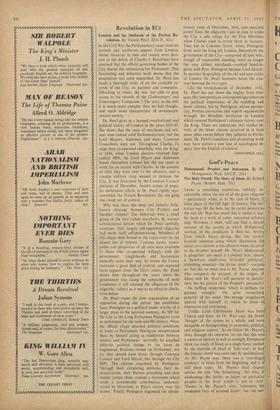Revolution in ECT
IN the Civil War the Parliamentary cause received staunch and vociferous support from London, whose resources in men and money were deci- sive in the defeat of Charles I. Historians have assumed that the official governing bodies of the City shared this enthusiasm for Parliament. This fascinating and definitive book shows that the assumption was quite unjustified. Dr. Pearl has made a thorough study of all the available re- cords of the City, its parishes and companies. (Shocking to relate, she was 'not able to gain access to the records of the Clothworkers' and Ironmongers' Companies.') The story as she tells it is much more complex than we had thought, and much more characteristic of seventeenth- century society.
Dr. Pearl gives us a learned constitutional and political history of London in the years 1625-43. She shows that the mass of merchants and arti- sans were indeed solid Parliamentarians; but the Lord Mayors, Aldermen and many Common Councillors were not. Throughout Charles l's reign they co-operated cheerfully with the King; in 1640, when London electors returned four radical MPs, the Lord Mayor and Aldermen found themselves isolated but did not cease to work for an accord with Charles, In the autumn of 1641 they went over to the offensive, and a royalist military coup seemed to threaten the City. It was frustrated by the Common Council elections of December. Amidst scenes of popu- lar enthusiasm which, as Dr. Pearl rightly says, resembled the French Revolution, the old gang was swept out of control.
Why was there this deep and hitherto little- known cleavage between City Fathers and humbler citizens? The Aldermen were a small group of the very richest merchants. By various constitutional devices which Dr. Pearl carefully examines, their largely self-appointed oligarchy had made itself self-perpetuating. Members of this clique were bound to the royal court by the closest ties of interest. Customs farms, mono- polies and perquisites of all sorts were available to those who co-operated willingly with the
government : knighthoods and baronetcies naturally came their way. In return the Crown exercised a great deal of control, and expected loyal support from the City's rulers. Dr. Pearl shows how throughout- the years when the government was losing the sympathy of most Londoners it still retained the allegiance of the oligarchy, subject as it was to no effective checks from below.
Dr. Pearl traces the slow organisation of an opposition during this period. She establishes Isaac Penington as a political leader worthy of a larger place in the national memory. As MP for the City in the Long Parliament Penington acted as spokesman for the rank-and-file citizens. When the official clique attached political conditions to loans to Parliament, Penington circumvented them by himself acting as middleman between lenders and Parliament: naturally he attached different political strings to the loans he engineered. Petitions rained on Parliament, not (as they should have dune) through Common Council and Lord Mayor, but through the City MPs. The citizens organised by Penington, 'through their circulating petitions, their de- monstrations, their Puritan preaching and their secular tavern clubs, created a movement which made a considerable contribution, underesti- mated by historians, to Pym's victory over the crown.' Finally Penington organised the revolu- tionary coup of December, 1641, and snatched power from the oligarchy—just in time to make the City a safe refuge for the Five Members when Charles tried to arrest them in January. They hid in Coleman Street, where Penington lived, until the King left London. Henceforth the government of the City—composed of men who,
though of respectable standing, were no longer the very richest merchants—worked hand-in- glove with Pym. Penington became Lord Mayor. In succinct biographies of the old and new rulers of London Dr. Pearl hammers home the con- trast between the two types.
Like the revolutionaries of December, 1641, Dr. Pearl has put down the mighty from their seats. Her interpretation correspondingly enhances the political importance of the middling and lesser citizens, led by Penington, whose pertina- city, Puritan conviction and superb organisation wrought the bloodless revolution in London which ensured Parliament's ultimate victory over the King. There are indications that similar re- volts of the lesser citizens occurred in at least some other towns before they adhered to Parlia- ment. Dr. Pearl's trenchant and pioneering book may have started a new line of sociological in- quiry into the English revolution.
* -
C
C
A I ever "A CHRISTOPHER HILL














































 Previous page
Previous page